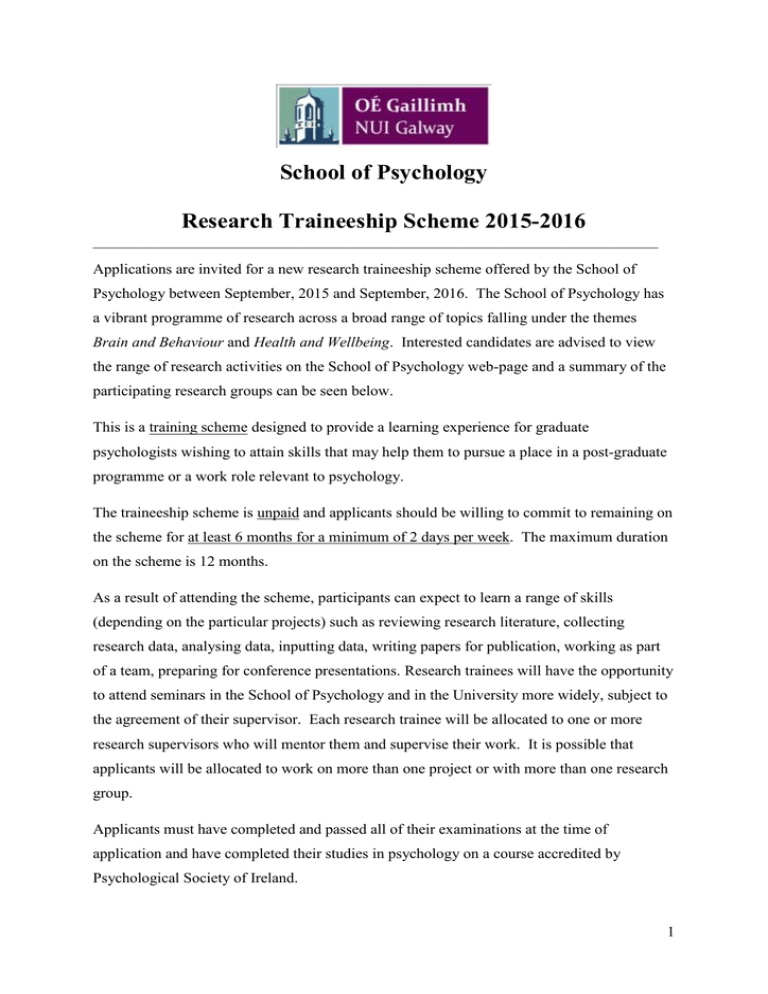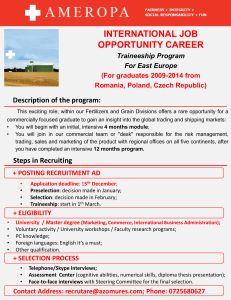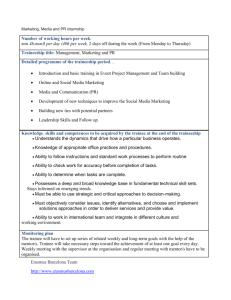School of Psychology Research Traineeship Scheme 2015-2016
advertisement

School of Psychology Research Traineeship Scheme 2015-2016 _________________________________________________________________________ Applications are invited for a new research traineeship scheme offered by the School of Psychology between September, 2015 and September, 2016. The School of Psychology has a vibrant programme of research across a broad range of topics falling under the themes Brain and Behaviour and Health and Wellbeing. Interested candidates are advised to view the range of research activities on the School of Psychology web-page and a summary of the participating research groups can be seen below. This is a training scheme designed to provide a learning experience for graduate psychologists wishing to attain skills that may help them to pursue a place in a post-graduate programme or a work role relevant to psychology. The traineeship scheme is unpaid and applicants should be willing to commit to remaining on the scheme for at least 6 months for a minimum of 2 days per week. The maximum duration on the scheme is 12 months. As a result of attending the scheme, participants can expect to learn a range of skills (depending on the particular projects) such as reviewing research literature, collecting research data, analysing data, inputting data, writing papers for publication, working as part of a team, preparing for conference presentations. Research trainees will have the opportunity to attend seminars in the School of Psychology and in the University more widely, subject to the agreement of their supervisor. Each research trainee will be allocated to one or more research supervisors who will mentor them and supervise their work. It is possible that applicants will be allocated to work on more than one project or with more than one research group. Applicants must have completed and passed all of their examinations at the time of application and have completed their studies in psychology on a course accredited by Psychological Society of Ireland. 1 Interviews will be conducted by the individual research groups – interviews are likely to take place during the first two weeks of September. The number of places on the scheme is limited and so a competitive process may apply where applicants will be ranked based on their academic grades, their letter of application and their performance at interview. Trainees may be required to go through Garda vetting (organised by the University). To apply. Please submit a single document containing (1) A letter of application outlining why you would like to commence a traineeship (max. 500 words) (2) A current CV with academic awards and grades (3) The names of two academic or professional referees who know you well (4) The attached “Preference Sheet” to indicate the research group(s) for which you would like to be considered. Applications should be submitted by 5pm on Friday 14 August, 2015 to: psychology@nuigalway.ie 2 Research Groups. Applied Behaviour Analysis (ABA) Group. Research in ABA is focused on the evaluation of interventions and curricula designed to improve socially significant behaviour for individuals presenting with various developmental disorders. We also evaluate interventions for typically developing children within mainstream education. Projects include: (1) outcomes of precision teaching on reading and math skills (2) evaluation of evidence based practices on social skills in children with autism (3) workplace employment skills for adolescents with autism and intellectual disabilities. Opportunities on other projects will be possible. Leader: Dr. Jennifer Holloway One traineeship available Centre for Neuroimaging, Cognition & Genomics (NICOG). The Cognitive Genetics and Therapy (CogGene) group is a core group in NUIG’s Center for Neuroimaging, Cognition and Genomics (NICOG). Our research is focused on the key question: how do genes increase risk for psychosis? To address this question we are studying the effects of recently identified psychosis risk genes on brain structure and brain function. Two recent developments in this work include focusing on the effects of risk genes on aspects of social cognition, and communication or ’connectivity’ between brain regions. Leader: Prof. Gary Donohoe One traineeship available Centre for Pain Research (CPR). CPR is Ireland’s largest research group dedicated to the scientific study of pain. Trainees can participate in some of the following projects: (1) Prevalence, impact and cost of chronic pain in children (2) eHealth: Acceptance and Commitment Therapy for Chronic Pain (3) The prevalence and impact of pain and multimorbidity (4) Risk factors for chronic pain after surgery (5) Parental responses to pain in children (6) Online treatment for social anxiety (in conjunction with Student Counselling Service). Leader: Dr. Brian McGuire Up to three traineeships available Contextual Behavioural Science Group. Contextual behavioural science is an approach to psychology that takes action in context as its core focus and strives to achieve beneficial influence over behaviour for applied purposes. It includes an account of human language and cognition known as Relational Frame Theory. Current projects (i) modelling and investigating paranoid delusions (ii) modelling and investigating analogical reasoning (iii) training key intellectual repertoires in young children. Leader: Dr. Ian Stewart. One traineeship available Health Behaviour Change Research Group (HBCRG). The HBCRG aims to promote the use of Health Psychology expertise in the development and evaluation of health behaviour change interventions. The HBCRG focuses on a range of health related behaviours (smoking, diet, exercise, medication adherence) relevant to the prevention and management of chronic illnesses. Current projects include (i) Targeting patient and healthcare professional behaviours to improve outcome in diabetes (ii) Improving sexual assessment and counselling in cardiac rehabilitation Leader: Dr. Molly Byrne One traineeship available. 3 Psycho-oncology Research Group. The Psycho-oncology group conducts research on the psychological, social and behavioural aspects of cancer. Current projects include (i) the role of cancer related masculine threat, illness perceptions and self efficacy in predicting adjustment to prostate cancer (ii) the role of coping and mood in predicting benefit finding over time in women with breast cancer (ii) the efficacy of m-health applications in promoting breast cancer awareness Leaders: Dr. Annmarie Groarke & Dr. Jane Walsh One traineeship available Risky and Extreme Behaviour Research Group. The objective of the research group is to understand, assess and mitigate against destructive risk taking and violent behavior. The research trainee will work on the RNLI and Irish Water Safety funded project on drowning in the Republic of Ireland. S/he will also have an opportunity to work on projects relating to violence and extremism, currently funded by the Irish Research Council and Enterprise Ireland. Leader: Dr. Kiran Sarma One traineeship available 4 NUI Galway Research Traineeship Scheme 2015-2016 Preference Sheet Your name: To help us to plan, approximately how much time do you expect to be available: ________ days per week for ________ months. Please rank order your top three preferences, placing 1 beside your first preference, 2 beside your second preference, 3 beside your third preference. Note that while preferences will be taken into account, allocation to a research group may not align with your preference and may be based on other factors such as skill match, space and availability of a supervisor. Rank top Research Group three preferences Applied Behaviour Analysis Group. Contextual Behavioural Science Group. Health Behaviour Change Research Group (HBCRG). Risky and Extreme Behaviour Research Group. Centre for Neuroimaging, Cognition & Genomics (NICOG). Centre for Pain Research (CPR). Psycho-oncology Research Group. 5


